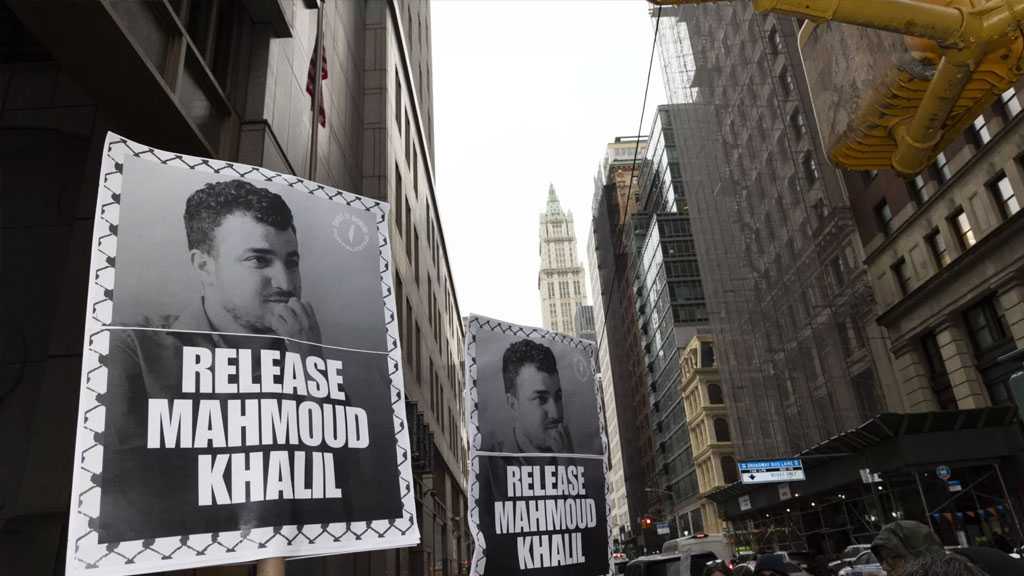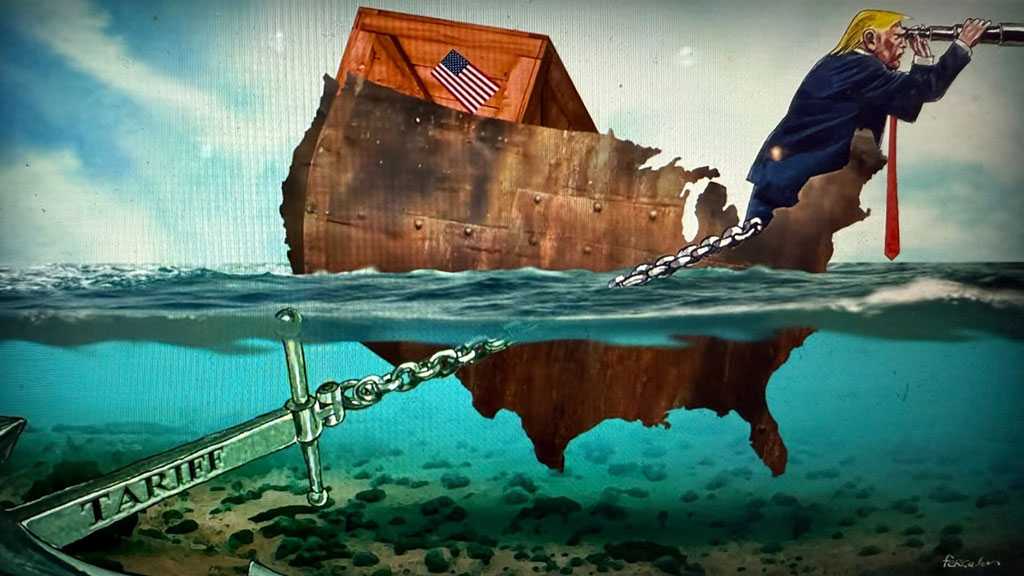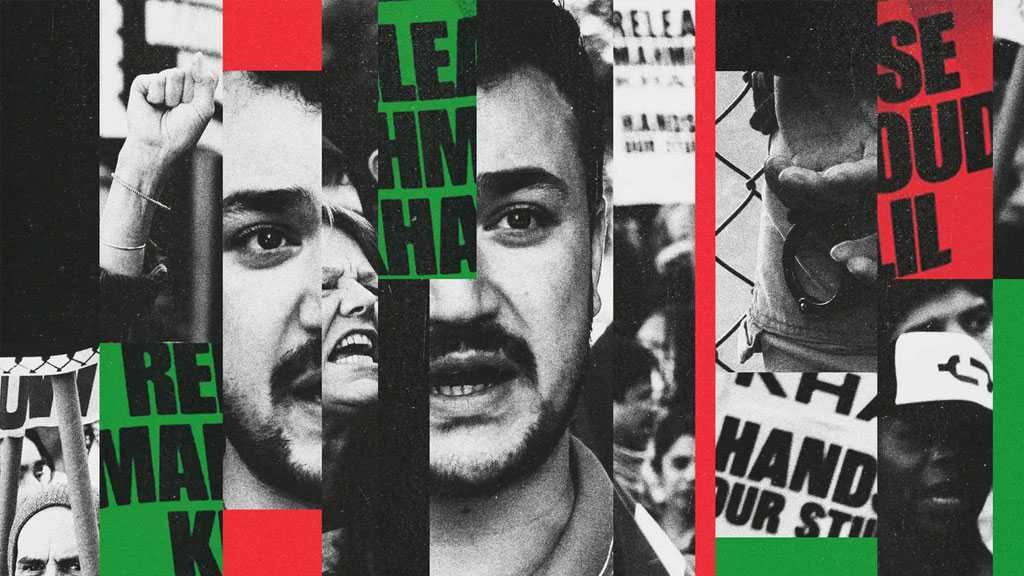League of Nationalists...
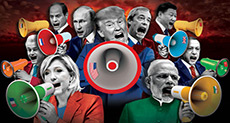
The Economist
All around the world, nationalists are gaining ground. Why?
After the sans culottes rose up against Louis XVI in 1789 they drew up a declaration of the universal rights of man and of the citizen. Napoleon's Grande Armée marched not just for the glory of France but for liberty, equality and fraternity.
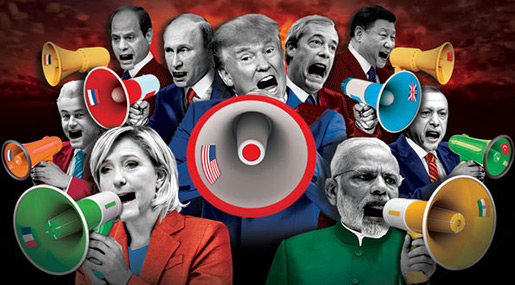
By contrast, the nationalism born with the unification of Germany decades later harked back to Blut und Boden-blood and soil-a romantic and exclusive belief in race and tradition as the wellspring of national belonging. The German legions were fighting for their Volk and against the world.
All societies draw on nationalism of one sort or another to define relations between the state, the citizen and the outside world. Craig Calhoun, an American sociologist, argues that cosmopolitan elites, who sometimes yearn for a post-nationalist order, underestimate "how central nationalist categories are to political and social theory-and to practical reasoning about democracy, political legitimacy and the nature of society itself."
It is troubling, then, how many countries are shifting from the universal, civic nationalism towards the blood-and-soil, ethnic sort. As positive patriotism warps into negative nationalism, solidarity is mutating into distrust of minorities, who are present in growing numbers. A benign love of one's country-the spirit that impels Americans to salute the Stars and Stripes, Nigerians to cheer the Super Eagles and Britons to buy Duchess of Cambridge teacups-is being replaced by an urge to look on the world with mistrust.
Some perspective is in order. Comparisons with the 1930s are fatuous. Totalitarian nationalism is extinct except in North Korea, where the ruling family preaches a weird mixture of Marxism and racial purity, enforced with slave-labor camps for dissidents. And perhaps you could add Eritrea, a hideous but tiny dictatorship. Nonetheless, it is clear that an exclusive, often ethnically based, form of nationalism is on the march. In rich democracies, it is a potent vote-winner. In autocracies, rulers espouse it to distract people from their lack of freedom and, sometimes, food. The question is: where is it surging, and why?
The most recent example is Donald Trump, who persuaded 61m Americans to vote for him by promising to build a wall on the Mexican border, deport illegal immigrants and "make America great again". Noxious appeals to ethnic or racial solidarity are hardly new in American politics, or restricted to one party. Joe Biden, the vice-president, once told a black audience that Mitt Romney, a decent if dull Republican, was "gonna put y'all back in chains". But no modern American president has matched Mr Trump's displays of chauvinism. That no one knows how much of it he believes is barely reassuring.
His victory will embolden like-minded leaders around the world. Nigel Farage of the UK Independence Party [UKIP], the politician most responsible for Brexit, has already visited Mr Trump, greeting him with a grin wide enough to see off the Cheshire cat. Viktor Orban, Hungary's immigrant-bashing prime minister, rejoiced: "We can return to real democracy... what a wonderful world."
The consequences for the European Union could be disastrous. In France pollsters no longer dismiss the possibility that Marine Le Pen, the charismatic leader of the National Front [FN], could be elected president next year. Compared with other Europeans, French voters are strikingly opposed to globalization and international trade, and few think immigrants have had a positive effect on their country. Ms Le Pen promises that she would pull France out of the euro and hold a "Frexit" referendum on membership of the EU. The single currency might not survive a French withdrawal. And if French voters were to back Frexit, the EU would surely fall apart.
The Rush for the Exit
European elites once assumed that national identities would eventually blend into a continental bouillabaisse. But the momentum is now with parties like the FN, including Hungary's Fidesz, Poland's Law and Justice Party and Austria's Freedom Party [one of whose leaders, Norbert Hofer, could win Austria's largely ceremonial presidency next month]. Ms Le Pen's language is typical. She caters to nostalgia, anxiety and antipathy to the liberal international order. ["No to Brussels, yes to France", goes one slogan.] She laments the decline of a proud people and vows to make France great again.
Unlike Mr Trump, Ms Le Pen has never called for a ban on Muslims entering the country; rather, she talks about curbing the "gigantic wave" of immigration. A lawyer by training, she defends her arguments with reference to France's rules on keeping religion out of public life. Yet her voters are left in little doubt as to which sorts of immigrants she disapproves of, and whom she counts as French. An FN campaign poster for regional elections in 2015 showed two female faces: one with flowing hair and the French tricolor flag painted on her cheeks, the other wearing a burqa. "Choose your neighborhood: vote for the Front", ran the text.
Ms Le Pen's popularity has dragged other politicians onto similar territory. Nicolas Sarkozy, a center-right former president, wants the job again. As soon as you become French, he declared at a recent campaign rally, "Your ancestors are Gauls." At another, Mr Sarkozy said that children who did not want to eat pork at school should "take a second helping of chips"-in other words, that it was up to non-Christians whose religions impose dietary restrictions to make do with the food on offer, not up to schools to accommodate them. France is witnessing a "defensive nationalism", says Dominique Moïsi of the Institut Montaigne, a think-tank, "based on a lack of confidence and a negative jingoism: the idea that I have to defend myself against the threat of others."
Something similar is on the rise elsewhere in Europe, too. In 2010 the Sweden Democrats [SD], a nationalist party, put out a television ad that captured the popular fear that Sweden's generous welfare system might not survive a big influx of poor, Muslim asylum-seekers. An elderly white woman with a Zimmer frame hobbles down a dark corridor towards her pension pot, but is overtaken by a crowd of burqa-clad women with prams, who beat her to the money.
At least one channel refused to air it, but it spread online. Polls suggest the SD is now one of Sweden's most popular parties.
In the Netherlands Geert Wilders, the leader of the anti-Muslim, anti-immigrant Party for Freedom, is on trial for "hate speech" for goading his audience to chant that it wanted "fewer Moroccans" in the country. Polls put his party in first or second place in the run-up to the national election in March; its popularity has risen since the start of the trial.
Britain's vote in June to leave the EU was also the result of a nationalist turn. Campaign posters for "Brexit" depicted hordes of Middle Eastern migrants clamoring to come in. Activists railed against bankers, migrants and rootless experts; one of their slogans was "We want our country back". After the vote David Cameron, a cosmopolitan prime minister, resigned and was replaced by Theresa May, who says: "If you believe you're a citizen of the world, you're a citizen of nowhere. You don't understand what the very word ‘citizenship' means."
Even before Britain has left the EU, the mere prospect has made the country poorer: the currency is down 16% against the dollar. Still, few Brexiteers have regrets. In Margate, a seaside town full of pensioners, it is hard to find anyone who voted to remain. Tom Morrison, who runs a bookshop, says: "[We] should be allowed to make our own laws...At least our mistakes will be our own mistakes."
...
In China a similarly ethnic, non-universalist nationalism is being pressed into service by the Communist Party. The party seeks to blur the distinction between itself and the nation, and to prop up its legitimacy now that economic growth, long the main basis of its claim to power, has slowed. Soon after becoming president in 2012, Xi Jinping launched the "Chinese Dream" as a slogan to promote the country's "great revival". A "patriotic education" campaign extends from primary school all the way up to doctoral students.
...
A similar story is playing out in Turkey, a country that only a few years ago appeared firmly on course to join the EU. Now its president, Recep Tayyip Erdogan, vows to build a "New Turkey", bravely standing up to coup-plotters and their imaginary Western enablers. He recently attended a mass rally celebrating the conquest of Constantinople in 1453. He accuses Turkey's duplicitous Western allies of trying to "pick up the slack of crusaders". Such rhetoric is intended to justify the arrests of 36,000 people since a coup attempt in July.
In India ethnic nationalism, never far beneath the surface, is worryingly resurgent. Since 2014 the country has been ruled by Narendra Modi of the Hindu-nationalist Bharatiya Janata Party [BJP]. The party seeks to distance itself from radical Hindutva [Hindu nationalist] groups, which criticize it as "soft" on Pakistan, Muslims and those who harm cows [which are sacred to Hindus]. And Mr Modi is urbane, pro-business and friendly towards the West. But he is also a lifelong member of the RSS [National Volunteer Organization], a 5m-strong Hindu group founded in 1925 and modelled loosely on the Boy Scouts.
...


